Characterization of Hydraulic Power in Free-Stream Installations
Abstract
The performance of open-channel hydropower devices can be optimized by maximizing the product of their load, hydraulic, and generator efficiencies. The maximum hydraulic power theoretically available must be defined according to the operational scenario retained for the device of interest. In the case of a device operating within a wide, unobstructed channel, the existence of a maximum hydraulic power and the operating speed required to reach it are first predicted using a one-dimensional flow model. This model is then extended to account for the effect of device ducting. As a result, given the available surface level drop and a single duct characteristic parameter, the model predicts the optimum device operating speed, whether the duct can improve performance, and the relative duct size which maximizes the installation’s power density, all at a very low computational cost.
1. Introduction
It is now widely accepted that fluid flows in the environment represent a resource whose exploitation can make a significant contribution towards solving our current energy production challenge. While the bulk of this contribution currently comes from high-head hydraulic installations and axial wind turbines, research is also being carried out to optimize unconventional devices such as Wells [1], Savonius [2], or Darrieus [3] turbines, which are suited to specific installation sites or operating conditions.
One further area of interest is the exploitation of water currents with low-power, low-footprint devices [4]. Conventional micro-hydro (<100 kW) and pico-hydro (<5 kW) installations are associated with high global sustainability ratings [5]; in particular, devices operating without additional damming or modification to channel beds have an extremely low impact on fauna and flora and are most likely to meet the most stringent environmental regulations in Europe or even Germany. Because they feature relatively high availability and can be installed with relative ease near populated areas, machines such as floating water wheels and turbines may make a valuable contribution towards increasing electrification or decentralizing existing power networks.
It is immediately apparent, however, that these devices are afflicted with low-power densities and may feature relatively high power-specific acquisition costs. The first issue of maximizing efficiency is considered in the present publication, while the minimizing of associated costs is considered separately under the guidance of other project partners [6]. The complex nature of fluid flows within these machines (three-dimensional, turbulent, featuring free surfaces) makes it difficult to predict a priori their power potential. The final stages of the design of such turbomachines are in practice carried out using Computational Fluid Dynamics (cfd) simulations and experimental measurements. For such flows involving moving parts and free surfaces, considerable computational resources and time budgets are required. In addition, errors associated with the volume-of-fluid (vof) technique, and especially the inherent uncertainties associated with the Reynolds averaging (rans) of the momentum equations in cfd, require devoting additional resources to calibration and validation of simulation results.
In this view, simpler models permitting faster computations may provide an opportunity for early-stage optimization over a considerably broader range of parameters. Additionally, the interdependency of design and operating parameters—for example, the use of floats and rigs to duct water flow to the device affects both the power made available to the machine and its internal efficiency—is such that a theoretical analysis of the achievable performance is a first, essential step towards developing high-efficiency systems.
The motivation for this paper is thus to propose a framework to measure the efficiency of hydraulic devices operating in free-stream flows significantly larger than themselves. The parameters controlling the design and operation of such machines will be first derived. Optimal conditions will be identified. Then, the flow characteristics and performance changes resulting from the use of stationary ducts will be discussed.
2. Parameters for Hydropower Performance Evaluation
Several approaches can be taken for quantifying the performance of hydraulic power devices. The following criteria and notation, illustrated in Figure 1, are used in the present analysis.
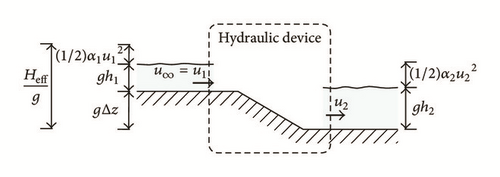
Nevertheless, in the case of a device operating within a wide channel (such as a tidal turbine), it may be impossible to identify a single mass flow rate corresponding to a streamtube with uniform properties, and needs to be evaluated with integral (1), which requires extensive knowledge of the velocity field.
The hydraulic power transmitted to or from the device can have an extremum value for a given set of constraints. The existence and value of this maximum or minimum depend on the parameters which are assumed given, that is, on the chosen operational scenario. The purpose of the present document is to study and determine best design and operating conditions.
The energy flow through a hydraulic machine can be conceptualized as shown in Figure 2. The performance of a hydraulic machine is then evaluated using the following three efficiencies.
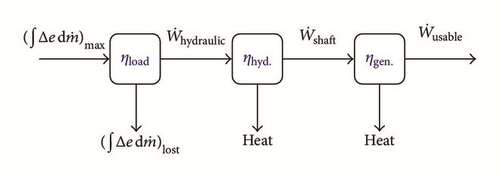
Because of the high specific heat capacity of water, losses converted into heat do not translate into easily measurable temperature changes, in particular for free surface flows and for such low-power installations. In practice, a direct experimental measurement of the hydraulic efficiency of such an installation is therefore very difficult.
Differing definitions for the efficiency may be constructed; for example, a different turbine efficiency may be devised to relate the shaft power to the flow wake impact [8]. Nevertheless, this study focuses on the energy conversion process. The three efficiencies in (7) are independent but may be affected together. For instance, the rotating speed of the impeller would impact both ηgenerator and ηhydraulic. In what follows, the focus is on hydrodynamics and ηgenerator is not further considered.
At that point, it is important to stress out that the efficiency values η introduced previously have an unambiguous definition and fulfill the condition η ≤ 1. On the other hand, the power coefficient is merely a nondimensional parameter with a partly arbitrary character. As a result, the value of CP might even exceed 1. Different values for the maximum power coefficient CP max. may be attributed to a given machine, because either the underlying assumption in defining the optimum case or the definition of CP may differ. These are the only reasons why Pelz’s limit described later in (11) does not converge towards Betz’s classical result when g → 0 m s−2 and Δz → 0 m.
Given this context, and considering only steady fluid flows with uniform inlet and outlet properties, the open question raised in this paper is “which optimum operating conditions will maximize the hydraulic power of any arbitrary device subjected to given altitude drop and viscous losses?”
3. Maximum Power in Obstructed Channel Flow
- (1)
A full obstruction of the upstream fluid flow
- (2)
An entirely unobstructed downstream flow
- (3)
A limited outlet width.
Thus, in this model, condition (2) turns the outlet water height h2 into a control variable, while condition (1) sets the mass flow , and condition (3) sets the outlet width b2, as input constants. The known mass flow passes through the device at all times.
This optimum, which can be rewritten as , is a benchmark to evaluate the performance of hydraulic machines working with a fully controlled stream, that is, in installations where the fluid is guaranteed to enter the device and where the outlet flow can be discharged with any chosen water level height h2. Indeed, during performance evaluations of such devices, the mass flow rate is a direct input variable [12].
The removal of condition (1) (full flow obstruction, with the entire stream passing through the device) has been later explored by Pelz and Metzler [13]: a model is then obtained for the performance of channel hydraulic devices installed on the bottom of channels and with lateral flow bypass.
- (i)
the mass flow flowing through the device is not readily known because it is a function of the operating conditions;
- (ii)
it cannot be assumed that an unobstructed, steeply sloped bed at altitude z2 is available at the outlet to receive the water leaving the machine. Instead, the outlet boundary condition will be conditioned by the water level altitude {z2 + h2} of an existing body of water (e.g., a reservoir) independent of the device operation.
A machine operating in such conditions would therefore attain a maximum hydraulic power different from that quantified in (11). For such a case, constraining the value of as input variable, as in [15], would result in grossly overestimated power calculations. The purpose of the next section is to determine a realistic prediction of optimal operation.
4. Maximum Power in Unobstructed Channel Flow
A model is developed here to evaluate the performance of a hydraulic power device operating in a wide channel and constrained by a given outlet water altitude {z2 + h2}. This model is based on the classical actuator disk models developed by Froude, Betz, Joukowski, and other scientists (described, e.g., by van Kuik et al. in 2015 [16]). Building on top of this classical theory, the effects of altitude change and duct pressure loss will be included in the analysis. This model assumes uniform inlet and outlet velocities; however, advances made in the modeling of wakes [17] and wall effects [18] may lift this restriction in the future.

When one considers the machine as a black box, the hydraulic power production can be described as a one-dimensional phenomenon. Here, for clarity, the machine is arranged so that all forces and velocities are aligned with the horizontal direction, x.
In an ideal machine designed for this environment, water would be guided to and from an actuator surface, across which hydraulic power is extracted from the fluid (Figure 4). The velocity changes of the fluid are matched with cross-sectional area changes along the flow, so that the pressure distribution within the device can be traced as in Figure 5 and quantified as follows.
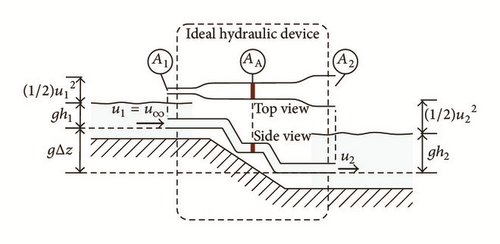
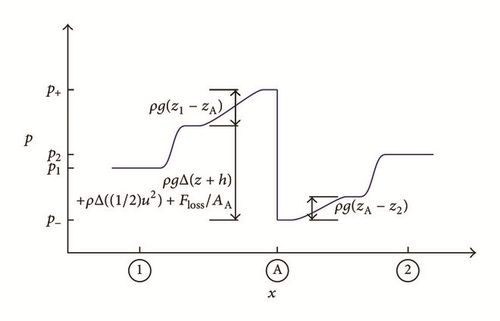
In this analysis, the sign convention is as described in Figure 3; that is, Δ(z + h) < 0 when the water level drops and Floss is always negative; thus, whenever hydraulic power is produced by the device, Factuator < 0.
This expression reduces as expected to that of Betz in the case where either Δ(z + h) or g tend to zero. Similarly, when u1 = u2, that is, no kinetic energy is withdrawn from water, the power tends towards , as expected of a high-head hydropower installation.
In order to maximize power, a compromise must be made at the actuator surface: higher actuator velocities increase the mass flow but reduce kinetic energy harvest; while lower actuator velocities increase kinetic energy recovery at the cost of decreased mass flow. This compromise is additionally affected by the (usually negative) potential energy term gΔ(z + h) and the losses Floss due to friction.
- (1)
A known device actuator surface area
- (2)
A known water surface altitude drop independent of the device
Here, condition (1) constrains the actuator surface area AA, while condition (2) constrains the water level drop Δ(z + h) as input variables; therefore, the main control variable becomes the cross-actuator velocity uA. Alternative boundary conditions describing, for example, a bypass flow [19] may be added in the future.
The solution of (17) is plotted in Figure 6, in which it is seen that unfavorable (negative) values of KD decrease not only the maximum hydraulic power attainable by the machine (this was obviously expected) but also the optimum actuator speed needed to attain it. For KD < −1, the power coefficient is always positive (the device turns into a pump and does not extract any energy from the fluid); for KD < −4/3, the power curve no longer features an extremum outside of the standing condition (uA = 0).
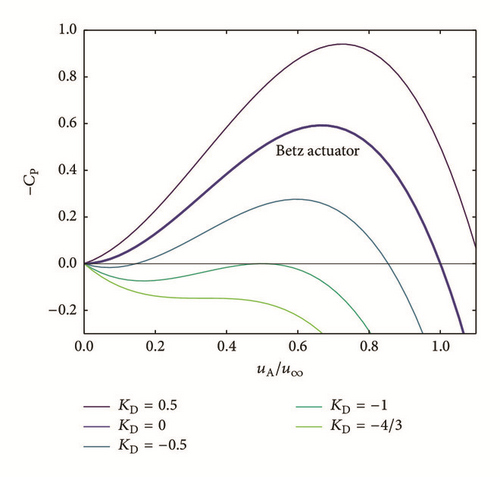
In the case where there is neither altitude drop nor friction loss, the drop coefficient KD is brought to zero and T → 1/3: then, uA opt. → (2/3)u∞; and the absolute value of the power coefficient tends towards 16/27, a classical value known as the Betz-Joukowski limit [16]. (It may be worth noting that Bergey [20] and van Kuik in 2007 [21] propose attributing this result to Lanchester as well. Van Kuik et al. in 2015 [16], however, show that although he expanded Froude’s work to reach the result |CP extremum| = 16/(27Q2), Lanchester failed to conclude definitely on the value of the factor Q, which shifts the value of the optimum velocity ratio due to an imbalance which he introduced in the actuator model [22]. For historical interest only, the value of Q, including some complex values, may be expressed as a function of KD by equating (19) to −16/27Q2.)
The relationship between the optimum actuator velocity and the drop coefficient value (see (18)) is plotted in Figure 7. An optimum only exists for KD > −4/3, since standing conditions are found to be best when KD ≤ −4/3. The machine can only extract hydraulic power when KD > −1. The optimum value uA opt. increases monotonically with KD: more favorable drop coefficients always shift the optimum velocity ratio upwards. This remains true even in the hypothetical case where uA opt. > u∞, as the energy expenditure required to accelerate the flow through the device (in (15a), ) is compensated by the resulting increase in mass flow. In a free-stream unchanneled installation (e.g., a floating or bed-bound tidal or river turbine), it is expected that Δ(z + h) = 0 and such devices will therefore always operate at −1 < KD ≤ 0.
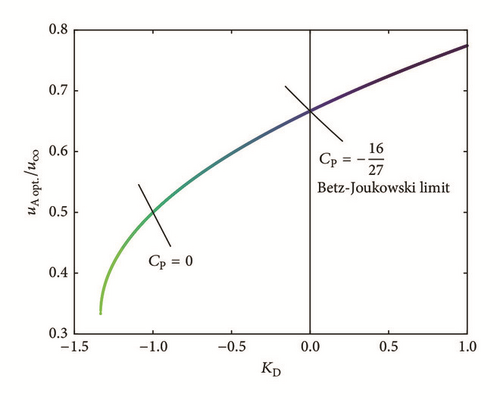
5. Performance Improvements through Ducting
- (1)
An increase in ηhydraulicηgenerator, through the optimization of the flow velocity distribution or rotation speed
- (2)
An increase in power density obtained through the reduction in the size of the moving parts for a given volume footprint of the device
- (3)
An increase of power obtained through the increase of the frontal area caused by the presence of the duct
The first of those cannot be described in general terms for a generic hydraulic machine and is best studied with the help of experimental and cfd techniques. The last two, however, can be examined by extending the model described above, in order to obtain tentative quantitative descriptions based on sensible hypotheses, and especially a broad qualitative characterization of the phenomenon.
A duct may increase the flow velocity locally but will always impede the overall flow through and around the device; thus, in order to determine the optimal duct size (that which will maximize power or power density), its effectiveness must be coupled back with the drop coefficient KD. Two possibilities are explored in this paper.
5.1. Simple Duct Loss Behavior
It is expected that, for a device of known geometry, neither KD0 nor KD2 are significantly affected by the device scale, the actuator speed, or the hydraulic power.
The actuator speed ratio that maximizes the load efficiency, uA opt./u∞, can now be described as a function of KD0 and KD2. The case where Af = AA (corresponding to the central case, R = 1, in Figure 9) is presented in Figure 8, where it is seen, as expected, that increases in the value of the drag coefficient lead to a decrease in the optimum velocity ratio and inevitably reduce the power output.
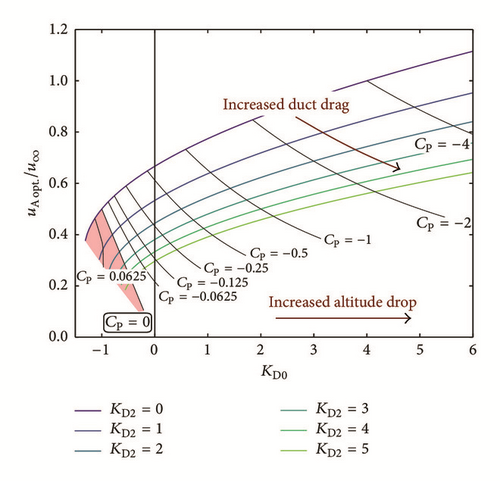
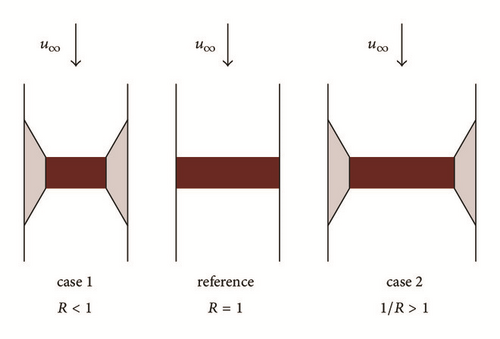
Since only the factor (R(uA/u∞)) appears in (24) when the drag coefficient KD2 is zero, any increase in uA generated by ducting is exactly compensated by a decrease in the size ratio R, so that the power coefficient is unaffected. In practice, however, KD2 > 0 and losses to friction are a function not merely of the free-stream velocity u∞ but also of the actuator operating velocity uA.
This optimum reduces to that of (18) when KD2 = 0 and to the value 2/3 predicted by Betz when both KD0 = 0 and KD2 = 0. Inserting (25) into (24) gives us an expression for the optimum power coefficient CP opt. as a function of the size ratio for any given duct.
- (i)
in case 1, a duct with known characteristic drag coefficient KD2 is used in the design phase to reduce the actuator size AA for a given inlet frontal area Af. In this case, R is reduced with the intent of increasing the power density (1/R)CP;
- (ii)
in case 2, a duct with known KD2 is added on an existing device with fixed actuator area AA. In that case, 1/R is increased with the intent of increasing the overall power .
The effect of both modifications, which amount to the same physical effect, can be observed in Figures 10 and 11, which represent how the power coefficient and power density evolve as R is varied, for various values of KD2.
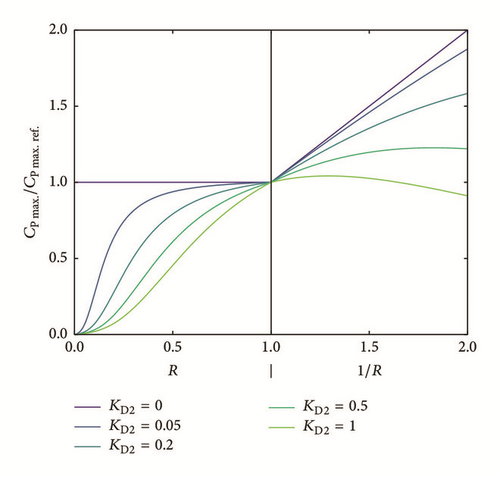
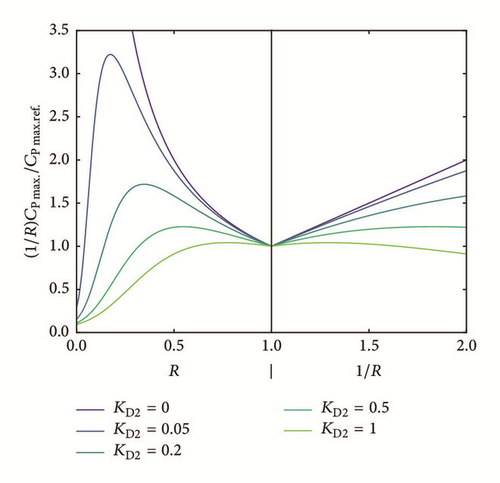
It is readily seen from those figures that low drag coefficients are associated with a high increase in power density through the use of ducting; the ratio R (size of actuator relative to frontal surface) then features an optimum value plotted in Figure 11. Nevertheless, high KD2 values result in cases where adding a duct results in neither power nor power density increase (i.e., Ropt. = 1) in that configuration. As expected, unless the frontal area is increased, the use of ducting can only result in a power coefficient decrease.
The geometrical features of the power and power density curves displayed in Figures 10 and 11 are also affected by the value of the drop coefficient KD0. This dependence can be visualized in Figure 12, in which the value Ropt. of the size ratio which maximizes the power density (1/R)CP max./CP ref. is plotted as a function of KD0 and KD2.

From Figure 12, it is seen that, for any one value of KD0 (a property of the operating environment), increasing values of the drag coefficient increase the optimum size ratio, that is, the relative size of the actuator that will maximize power density. For each value of KD0, there exists a drag coefficient value above which Ropt. = 1: in that case, the ducting can only reduce performance.
5.2. Two-Component Drag Model
The optimum duct size ratio given by this new model is plotted in Figure 13 (an expanded version of Figure 12) for a few arbitrary coefficient values.
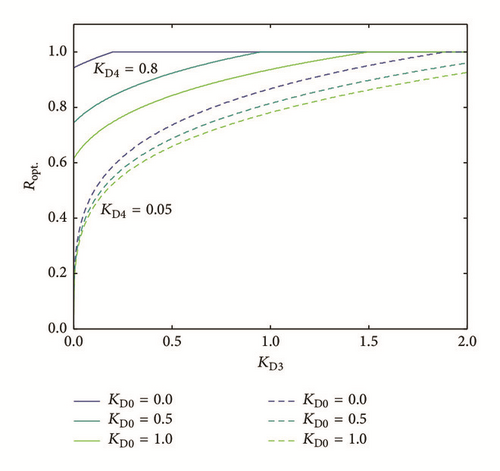
The quality of the optimum predictions above depends on the validity of the starting hypotheses (which assume that the flow can be modeled as one-dimensional and that the flow regime around the duct remains constant). Nevertheless, those results, depending on two or three parameters only, are computed extremely rapidly. Importantly, insights over the key mechanisms relevant to the ducting of free-stream hydraulic machines are provided by the model—describing, in particular, why not all ducting is beneficial and how that is affected by the operating environment.
6. Conclusions
A one-dimensional model describing the fluid flow through hydraulic devices is a useful tool to characterize the performance of such machines operated in conditions where the mass flow rate is a control variable and the outlet water height cannot be controlled. This corresponds, for instance, to a small turbine or water wheel installed in a large river, or a machine operating in a cascading flow alongside a dam. In such a model, the device operating speed required to attain full load efficiency and the corresponding maximum hydraulic power can be quantified independently of the hydraulic efficiency.
In a machine of given frontal area operating at 100% load efficiency, it is shown that the use of a stationary duct permits an increase in actuator velocities but can only result in a reduction of the power coefficient. In specific cases, this may nevertheless result in an increase in power density (in addition to an expected change in the hydraulic and generator efficiencies).
Quantitative results can be provided using a simple model for evaluating pressure losses generated by a duct (with the implicit assumption that the duct flow regime is never changed). A single duct performance parameter KD2 is then sufficient to determine numerically, for each installation, whether an optimal duct-to-actuator size ratio exists and to find its value. An illustrative model accounting for more subtle dependencies of the losses generated by ducting is also implemented. While such models are expected to require calibration and operating range restrictions in order to reflect results provided by experimental measurements, they provide design guidance at a computing cost many orders of magnitude smaller than those associated with cfd methods, which also require experimental validation to provide reliable results.
In future works, it may be possible to couple this framework with models describing the hydraulic and generator efficiencies of the machine, as well as to account for nonuniform inlet flow velocity distributions. Those extensions, coupled with numerical cfd simulations validated using water channel measurements, would lead to a powerful optimization tool to maximize the power generation of free-stream hydraulic devices.
Symbols
-
- AA:
-
- Actuator frontal area [m2]
-
- Af:
-
- Device frontal area [m2]
-
- b:
-
- Width of rectangular channel [m]
-
- CP:
-
- Power coefficient (def. (8)) [—]
-
- e:
-
- Specific mechanical energy [J kg−1]
-
- F:
-
- Froude number [—]
-
- g:
-
- Gravitational acceleration [m s−2]
-
- h:
-
- Height to water surface, positive upwards [m]
-
- Heff.:
-
- Effective head (def. in Section 3) [m]
-
- KD:
-
- Drop coefficient (def. (16)) [—]
-
- KD0:
-
- Static drop coefficient (def. (21)) [—]
-
- KD2:
-
- Drag coefficient (def. (20)) [—]
-
- KD3:
-
- Inner drag coefficient (def. (26)) [—]
-
- KD4:
-
- Outer drag coefficient (def. (26)) [—]
-
- :
-
- Mass flow [kg s−1]
-
- Q:
-
- Lanchester correction factor (cf. Section 4 and [16]) [—]
-
- q:
-
- Volume flow per unit width [m2 s−1]
-
- R:
-
- Size ratio (def. (23)) [—]
-
- T:
-
- Generic parameter used for clarity (def. (18)) [—]
-
- u:
-
- Velocity [m s−1]
-
- :
-
- Volume flow rate [m3 s−1]
-
- :
-
- Mechanical power gained or lost by the fluid [W]
-
- z:
-
- Altitude, positive upwards [m].
Greek Symbols
-
- α:
-
- Kinetic energy correction factor [—]
-
- Δ:
-
- Net difference
-
- η:
-
- Efficiency [—]
-
- ρ:
-
- Density [kg m−3]
Subscripts
-
- A:
-
- Actuator
-
- alt.:
-
- Due to altitude
-
- av.:
-
- Averaged in space
-
- max.:
-
- Maximum
-
- opt.:
-
- Optimum
-
- loss:
-
- Integral effect of pressure losses
-
- +:
-
- Immediately upstream of actuator surface
-
- −:
-
- Immediately downstream of actuator surface
-
- ∞:
-
- Far-field incoming conditions.
Sign Conventions
-
- Lengths:
-
- Lengths are measured positive upwards and downstream
-
- Fluid properties:
-
- Fluid property changes are measured from the point of view of the fluid (i.e., negative values indicate a loss by the fluid, thus a gain for the machine operator).
Conflicts of Interest
The authors declare that there are no conflicts of interest regarding the submission of this manuscript.
Acknowledgments
The authors are grateful for the financial support provided by the Fluss-Strom project financed by the Bundesministerium für Bildung und Forschung (German Federal Ministry of Education and Research) under Project no. 1714.




